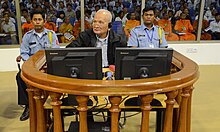Nuon Chea
In 2014, Nuon Chea received a life sentence for crimes against humanity, alongside another top-tier Khmer Rouge leader, Khieu Samphan, and a further trial convicted him of genocide in 2018.
The family prayed at a Theravada Buddhist temple, but observed Chinese religious customs during the Lunar New Year and Qingming festival.
[7] In the 1940s, Nuon Chea studied at Wat Benchamabophit School and Faculty of Law, Thammasat University in Bangkok and worked part-time for the Thai Ministry of Foreign Affairs.
[11] As documented in the Soviet archives, Nuon Chea played a major role in negotiating the North Vietnamese invasion of Cambodia in 1970, with the intent of forcing the collapse of Lon Nol's government: "In April–May 1970, many North Vietnamese forces entered Cambodia in response to the call for help addressed to Vietnam not by Pol Pot, but by his deputy Nuon Chea.
In 1970, in fact, Vietnamese forces occupied almost a quarter of the territory of Cambodia, and the zone of communist control grew several times, as power in the so-called liberated regions was given to the CPK [Khmer Rouge].
"[12] As the recently proclaimed state legislature, the Kampuchean People's Representative Assembly held its first plenary session during 11–13 April 1976, Chea was elected president of its Standing Committee.
[13] According to Dmitry Mosyakov, "In October 1978, Hanoi still believed that 'there were two prominent party figures in Phnom Penh who sympathized with Vietnam—Nuon Chea and the former first secretary of the Eastern Zone, So Phim.
Vietnamese hopes that these figures would head an uprising against Pol Pot turned out to be groundless: So Phim perished during the revolt in June 1978, while Nuon Chea, as it is known, turned out to be one of the most devoted followers of Pol Pot—he did not defect to the Vietnamese side....It is difficult to understand why until the end of 1978 it was believed in Hanoi that Nuon Chea was 'their man' in spite of the fact that all previous experience should have proved quite the contrary.
[16] The government under Prime Minister Hun Sen, himself a former member of the Khmer Rouge, agreed to forsake attempts to prosecute Chea, a decision that was condemned by Western nations.
He also denied responsibility for mass killings, but this was contradicted by detailed documentation left behind by the Khmer Rouge regime itself, including bizarre "confessions" extracted under torture at Tuol Sleng and photographs of purge victims, as well as a recording made by a Cambodian journalist prior to Chea's 2007 arrest in which Chea admitted: "Believe me, if these traitors were alive, the Khmers as a people would have been finished. ...

